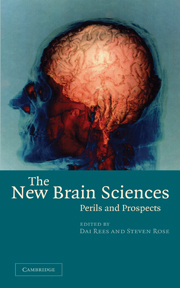Book contents
- Frontmatter
- Contents
- List of contributors
- Part I Introduction: the new brain sciences
- Part II Freedom to change
- 1 Do we ever really act?
- 2 The definition of human nature
- 3 Consciousness and the limits of neurobiology
- 4 Mind metaphors, neurosciences and ethics
- 5 Genetic and generic determinism: a new threat to free will?
- Part III Neuroscience and the law
- Part IV Stewardship of the new brain sciences
- Part V Conclusion
- References
- Index
3 - Consciousness and the limits of neurobiology
Published online by Cambridge University Press: 08 August 2009
- Frontmatter
- Contents
- List of contributors
- Part I Introduction: the new brain sciences
- Part II Freedom to change
- 1 Do we ever really act?
- 2 The definition of human nature
- 3 Consciousness and the limits of neurobiology
- 4 Mind metaphors, neurosciences and ethics
- 5 Genetic and generic determinism: a new threat to free will?
- Part III Neuroscience and the law
- Part IV Stewardship of the new brain sciences
- Part V Conclusion
- References
- Index
Summary
Consciousness has recently become an immensely fashionable theme within the new-found cultural popularity of the natural sciences. However, what is immediately noticeable about the proliferation over the past decade of books and journals with ‘consciousness’ in their titles or invoked in their texts is that they seem to be drawn to the cultural glamour of the concept, but with little sense that the concept of consciousness has an entirely other history. Consciousness seems to lie around in the culture like a sparkling jewel irresistible to the neurotheorists. There seems to be no recognition amongst the many biologists, artificial intelligencers, physicists and philosophers who have played in print with their new toy that the concept of consciousness is part of other discourses. Above all I want to underline that while for these neurotheorists consciousness is located within the individual human organism – and sometimes just the brain within that – the older tradition, coming from the humanities and social theory, sees it as located in subjectivity and intersubjectivity within a historical context. As David Lodge (2002) has pointed out, novelists may approach consciousness more readily than neuroscientists. The methodological individualism expressed in the objectivist language of the natural sciences erases both ‘me’ and ‘you’; by contrast in social theory both agency and structure are crucial. For social theory there can be no development of individual consciousness without a social context.
- Type
- Chapter
- Information
- The New Brain SciencesPerils and Prospects, pp. 59 - 70Publisher: Cambridge University PressPrint publication year: 2004
- 2
- Cited by



